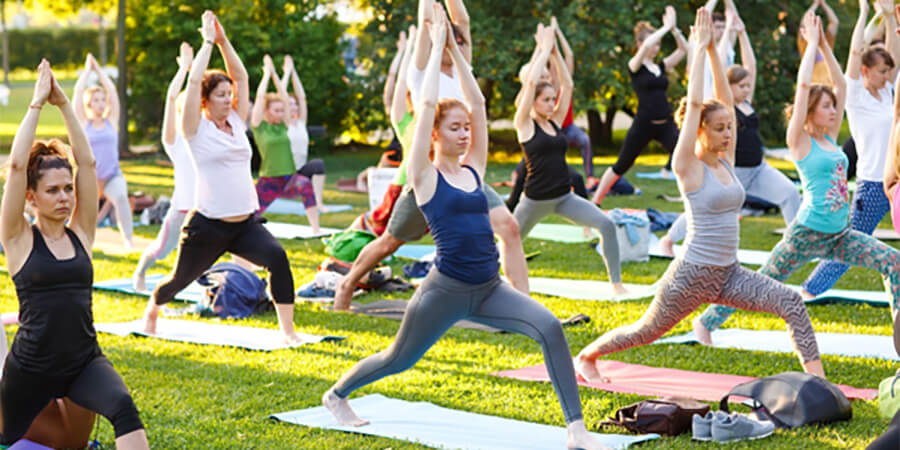The Skills You Need to Become a
Personal Trainer
See also: The Importance of Exercise
As one of the most in-demand career choices of the last few years and growth in the health and fitness sector expected to continue, becoming a personal trainer is an excellent option. And contrary to popular belief, you don’t need to look like a sculpted Greek god or be under 40 either.
So, what do you need to help other people meet their health and fitness goals? If you're passionate about helping people, or even if you just love a good workout, here are the skills you need to become a personal trainer.

Not Your Normal 9-5
Most personal trainers end up working for themselves, which means the freelance life, and that can get complicated very quickly. Time management skills will be essential, especially as you build a long list of clients. You’ll need to arrange meeting places (not everyone uses the same gym), allocate time to spend on planning as well as in-person sessions, and then conduct the lessons themselves.
Time management for a personal trainer is a core skill you're going to need. If you're not great at juggling your responsibilities, then you’ll need to start learning some smart ways to do so. Being a personal trainer, whether freelance or employed by a gym or health center, is rarely going to mean 9-5 hours (one of the reasons why it’s such a popular career choice). Workplaces can be extremely varied too, and you may need to factor in travel time if your clients want to work out at home or in the park.
The Importance of Persuasiveness
The work of a personal trainer is to motivate. You need to inspire your clients by pushing them harder, faster to get better results. The ability to inspire your clients can be a challenging lesson to learn. The good news is that there are ways to learn more about this critical skill.
Work at negotiation and persuasion skills that make it easier to understand the triggers to motivate your classes. While every client will be different, there are many universally accepted ways to be more persuasive. Take the time to learn those skills, and your client list will only grow. Fail to inspire, and your clients’ goals will always be slightly out of reach.
Strong Communication Skills
Over the last couple of years, the role of a personal trainer has undergone significant changes. As access to gyms and health centers became more difficult, many personal trainers made the move to online sessions. Now, most are offering a combination of lively one-on-one sessions online and more traditional in-person classes. This looks set to be the norm, which means communication skills are even more important to learn.
It's one thing to communicate face-to-face, but it's very different when you’re trying to motivate and inspire during a video call. Communication skills are vital for many careers, but they're also invaluable in our personal lives. Make sure you're great at communicating as you learn to become a personal trainer, and your clients will only appreciate you more.

Teaching Skills
A personal trainer isn’t just about shouting at people on the treadmill. They need to teach their clients how to exercise and the changes they need to make to their lives. The problem is that everyone learns differently. So, today’s personal trainer has to be aware of the many different learning styles and when best to use them. That’s going to be even more challenging if you're teaching larger groups instead of one-on-one sessions.
A personal trainer may not need all of the skills of a teacher, but the better they are at teaching, the more successful they’ll be as a health and fitness professional. The people that hire personal trainers do so for a reason, and in most cases, they want to learn. However, there will always be stubborn clients that need a different approach. Learn as much about different ways to teach and learn, and your career as a personal trainer will be more likely to be a success.
Business Management
Employment opportunities in gyms and health clubs are more available than ever, but that doesn’t mean most personal trainers work with a contract. The most common path is going freelance for at least a few years, which means you're running your own business. Without some basic business management skills, you're going to struggle to grow your client list and make your career sustainable.
Everything you can learn about running a business will be beneficial — from marketing yourself to improving your numeracy skills. You’re going to need to keep records, schedule your classes, manage your invoices, and engage with clients on social media. Working freelance without having any business skills will make your working day more difficult.
Enthusiasm and Positivity
One of the marks of being a top personal trainer is maintaining your drive and enthusiasm. That can be extremely challenging, especially if you've already spent all day in the gym. That's where leadership skills come in. Like your communication skills, the qualities of being a good leader aren't something that everyone naturally has — but you can learn them.
Being a better leader will also be helpful if you make the transition to group classes. That’s when you’ll be trying to motivate large groups of people, which every manager knows is always more difficult. Brush up on your leadership abilities, and you’ll be a better teacher and a better personal trainer. Fail to address your limited ability to lead, and your classes will be far more likely to fall flat.
Further Reading from Skills You Need
The Skills You Need Guide to Interpersonal Skills eBooks.
Develop your interpersonal skills with our series of eBooks. Learn about and improve your communication skills, tackle conflict resolution, mediate in difficult situations, and develop your emotional intelligence.
Becoming a Personal Trainer
As well as the skills listed above, you’re going to need some formal training too. You’ll need certain qualifications and certificates, and different places have different requirements. Take the time to do your research so that you know what’s required to become a personal trainer where you live.
Qualifications are only part of the equation, though. If you're too timid, too quiet, or appalling at managing your time, then your clients aren’t going to be with you long. Get your skills up to scratch, and your career as a personal trainer could take you higher (and healthier) than ever.
About the Author
Steven Dick is one of the directors of The Fitness Group, a UK-based brand that specialises in teaching people to become personal trainers. Now, thousands of students graduate from The Fitness Group every year and go onto build successful careers in the health and fitness sector.


